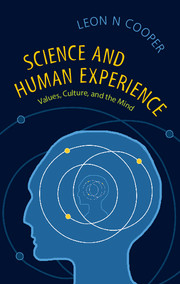Book contents
- Frontmatter
- Dedication
- Contents
- Preface
- Acknowledgement
- Part One Science and Society
- Part Two Thought and Consciousness
- Part Three On the Nature and Limits of Science
- 19 What Is a Good Theory?
- 20 Shall We Deconstruct Science?
- 21 Visible and Invisible in Physical Theory
- 22 Experience and Order
- 23 The Language of Physics: On the Role of Mathematics in Science
- 24 The Structure of Space
- 25 Superconductivity and Other Insoluble Problems
- References
23 - The Language of Physics: On the Role of Mathematics in Science
from Part Three - On the Nature and Limits of Science
Published online by Cambridge University Press: 05 November 2014
- Frontmatter
- Dedication
- Contents
- Preface
- Acknowledgement
- Part One Science and Society
- Part Two Thought and Consciousness
- Part Three On the Nature and Limits of Science
- 19 What Is a Good Theory?
- 20 Shall We Deconstruct Science?
- 21 Visible and Invisible in Physical Theory
- 22 Experience and Order
- 23 The Language of Physics: On the Role of Mathematics in Science
- 24 The Structure of Space
- 25 Superconductivity and Other Insoluble Problems
- References
Summary
Mathematics is one of the major hurdles that stand between most of us and an understanding of science, especially physics. Those who attempt to write a book on science, accessible to the non-scientist are warned that every equation cuts the, already small, number of potential readers in half. So, can we do without mathematics? Could we express our thoughts in ordinary language? Yes, it might be possible; but it would be extraordinarily cumbersome. Reflect for a moment: music would be possible without musical notation, but imagine giving musicians instructions, for even a simple symphony, using ordinary language without the musician's language: bars, notes etc. – Now all together, flutes, oboes, and strings. This is what physics and much of the rest of science would be without mathematics – possible, but severely crippled.
This essay is based on a chapter originally published in An Introduction to the Structure and Meaning of Physics in 1968.
In science, the saying goes, one weighs and measures, one deals in numbers; there is perhaps a suggestion that those elsewhere deal in a currency of less substance. At this point eyes close and minds go to sleep; the decimals unfortunately awaken memories of sultry afternoons in algebra class. It is, of course, true that physics deals with numbers and occasionally with very accurate measurement. One is impressed when an extraordinarily complex calculation of the quantity of magnetism the electron possesses, referred to a certain standard magnet, agrees with experimental observation to ten decimal places.
- Type
- Chapter
- Information
- Science and Human ExperienceValues, Culture, and the Mind, pp. 188 - 197Publisher: Cambridge University PressPrint publication year: 2014



